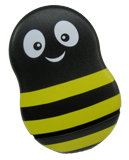June 13th, 2010 by Berci in Better Health Network, Health Tips
No Comments »

 Here’s Buzzy, a reusable pain relief device developed by a pediatrician. It works based on the gate control theory of pain:
Here’s Buzzy, a reusable pain relief device developed by a pediatrician. It works based on the gate control theory of pain:
Buzzy is a newly developed reusable pain relief device that children can bring to the doctor’s office with them to help dull the pain of shots! As the brainchild of Pediatrician Amy Baxter, Buzzy rapidly reduces pain when pressed onto the skin. Buzzy is especially helpful for children who receive shots often, like those suffering from diabetes. Buzzy can also be used for the small things, like taking splinters out! Not only is Buzzy a kid-favorite, but it’s safe, effective immediately on contact, FDA compliant, and environmentally friendly, too.
*This blog post was originally published at ScienceRoll*
June 6th, 2010 by Harriet Hall, M.D. in Better Health Network, Health Tips, News, Opinion, Research
No Comments »

Red meat consumption has been linked to diabetes, cardiovascular disease, and several types of cancer (breast, colorectal, stomach, bladder, prostate, and lymphoma).
There are plausible mechanisms: Meat is a source of carcinogens, iron that may increase oxidative damage, and saturated fat. But correlation and plausibility are not enough to establish causation.
Is red meat really dangerous? If so, how great is the risk? A couple of recent studies have tried to shed light on these questions, but they have raised more questions than they have answered. Read more »
*This blog post was originally published at Science-Based Medicine*
June 3rd, 2010 by Medgadget in Better Health Network, Health Tips, Research
No Comments »

 Millions of people with diabetes are forced to endure multiple finger pricks daily — an unpleasant practice that may impede compliance, and whose reliability is operator-dependent.
Millions of people with diabetes are forced to endure multiple finger pricks daily — an unpleasant practice that may impede compliance, and whose reliability is operator-dependent.
Now, Dr. Paul Barone and Dr. Michael Strano at the MIT Department of Chemical Engineering are developing a new approach to glucose monitoring.
Building on work they previously published in ACS Nano, the new technology employs a nanoparticle “tattoo” as a glucose sensor, which can then be continuously monitored by a device on the surface of the body. Read more »
*This blog post was originally published at Medgadget*
May 29th, 2010 by KerriSparling in Better Health Network, Humor, True Stories
No Comments »

You know you’re a diabetic mommy when…
- The bottle of glucose tabs is just as important as the bottle of breast milk in the diaper bag.
- You have already started wondering how you’re going to explain juice as “medicine” to the kiddo.
- When you wake up for 3am feedings and they double as a 3am blood sugar check.
- You start cooing sweetly at your meter when it gives you a result of 100 mg/dl. (“Oooh, what a good meter you are! Yes you are!”)
- Your baby ends up with a dot of blood on the back of her pajamas from your middle-of-the-night blood sugar check that didn’t stop bleeding right away.
- When you talk about “the pump,” you need to clarify “the insulin one, not the boob one.”
- Sometimes you have to draw numbers to see who gets to feed the baby. And by “draw” we mean blood samples.
- Nothing makes you happier than a full baby with a clean diaper and a full pump with a full battery.
- You need a diaper bag just for diabetes supplies.
- Your bedside table has just as many burp clothes as used test strips gathered at its base.
And when the Dexcom starts to “BEEEEEEEP!” you wonder if it needs a diaper change.
*This blog post was originally published at Six Until Me.*
May 25th, 2010 by Toni Brayer, M.D. in Better Health Network, Health Tips, News, Research
No Comments »

 The European Heart Journal studied 6,000 British civil servants and followed them for 11 years. They found that working an extra 3 to 4 hours a day is associated with increased coronary heart disease.
The European Heart Journal studied 6,000 British civil servants and followed them for 11 years. They found that working an extra 3 to 4 hours a day is associated with increased coronary heart disease.
The researchers controlled and adjusted for lifestyle, cardiac risk factors, and other factors that would skew the results, and still found that people who worked 3 to 4 extra hours a day had a 60 percent increase in risk for heart disease. Read more »
*This blog post was originally published at EverythingHealth*
 Here’s Buzzy, a reusable pain relief device developed by a pediatrician. It works based on the gate control theory of pain:
Here’s Buzzy, a reusable pain relief device developed by a pediatrician. It works based on the gate control theory of pain:




 Millions of people with diabetes are forced to endure multiple finger pricks daily — an unpleasant practice that may impede compliance, and whose reliability is operator-dependent.
Millions of people with diabetes are forced to endure multiple finger pricks daily — an unpleasant practice that may impede compliance, and whose reliability is operator-dependent.

 The European Heart Journal studied 6,000 British civil servants and followed them for 11 years. They
The European Heart Journal studied 6,000 British civil servants and followed them for 11 years. They 







